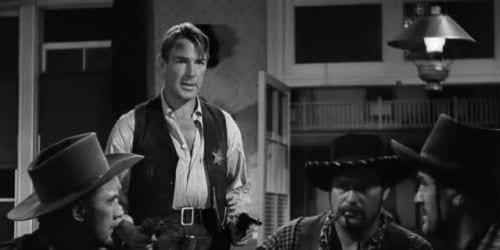
Only 71 minutes and packed with action and character, Frontier Marshal is a rare A project in the Fox career of Allan Dwan, one of the technically exuberant pioneers of the Teens and a once-famous A-list director of silents for Douglas Fairbanks and Gloria Swanson.
The masterful opening montage shows the town of Tombstone thrown up instantly in the desert as a response to greed (the discovery of silver) and the flourishing of a brawling lawlessness driven by economic competition. This is embodied by a crooked entrepreneur played by John Carradine, surrounded by belligerent lackeys including Lon Chaney Jr. They exploit a poor drunken Indian to make trouble in a rival’s bar, and it’s up to impromptu marshal Wyatt Earp (Randolph Scott at his most upright and manly) to take him out.
Everything in the movie happens immediately, including the instant friendship with a trigger-happy dandy in black called Doc Halliday (Cesar Romero), handsome and charming in the incipient decay of his tuberculosis. Note the name change from Holliday, and that’s not the movie’s widest deviation from historical mythology, as this movie’s scene at the OK Corral transpires in a manner you’ll never see it again, including the remake My Darling Clementine.
Halliday breezes into the saloon looking to plug somebody, anybody, and all it takes is Earp’s easy smile and forthright manner and soon they’re fondling each other’s pistols. That’s a stronger love story than Halliday’s problematic relations with a jealous bargirl (Binnie Barnes) or a plucky dumped sweetheart who’s tracked him from back East (Nancy Kelly). The battle for Halliday’s soul represents the forces of historical transition from the wild frontier to law and civilization. The women symbolize these contrasts, as shown by which one decides to stay and which to leave. When the Palace of Pleasure is replaced by a savings bank, the bargirl takes her cue: “When people start saving their money, it’s time for me to vamoose.” Kudos to writer Sam Hellman.
One of Dwan’s thangs is his love and use of space. The viewer has an unusually clear idea of the town’s layout, as what’s across the street (usually a rival business) is always clearly visible beyond the windows and swinging doors, as are the dozens of extras peopling them. The interiors are all provisional extensions of the wild outside. That’s why it’s important to have a crystal-sharp print for the deep-focus photography and packed compositions, as we have on this made-on-demand DVD-R from 20th Century Fox Cinema Archives.
Spoiler ahead: Dwan’s entry in World Film Directors (1987) finds some critics speaking of his “tragic view of life”, with John M. Smith declaring, “One of the central threads in Dwan’s career is the overcoming of despair…by an appreciation of the potentially permanent value of relationships which are less than ideal.” That perfectly describes this film, in which three characters are left adrift by the death of a self-hating “coward” who was fated to die and was cut down in his very moment of redemption. The elegiac finale mourns his passing.

![Call for Papers: All Things Reconsidered [MUSIC] May-August 2024](https://www.popmatters.com/wp-content/uploads/2024/04/all-things-reconsidered-call-music-may-2024-720x380.jpg)



